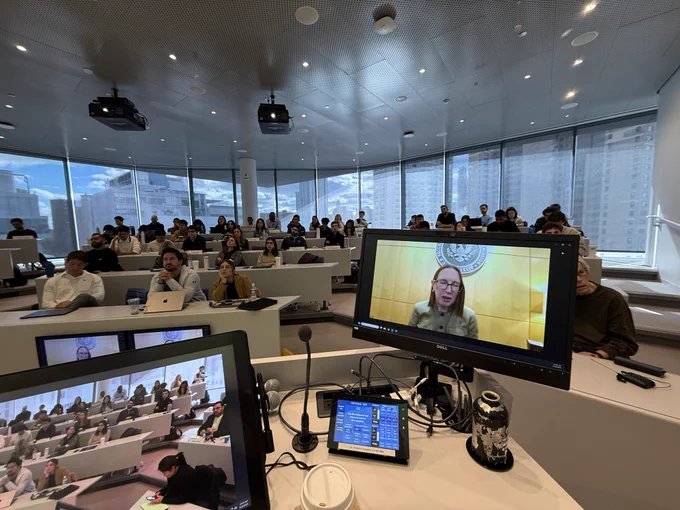@a16zcrypto | Prev Partner @Lathamwatkins | Write about crypto policy, decentralization, tokens & more - linktr.ee/milesjennings
San Francisco
Joined March 2009
- Tweets 4,025
- Following 1,569
- Followers 23,941
- Likes 17,925
Pinned Tweet
Over 4 years at @a16zcrypto, I've found writing to be the best tool for exploring crypto’s complexity—from advising founders to constructing policy.
It’s a discovery engine that demands clarity, consistency and transparency.
Here are 10 posts I learned the most from writing:
miles jennings retweeted
If we had more public servants like @HesterPeirce, we would be in a better place as a nation.
Whether you agree or disagree with her, she makes an effort to speak to people, to explain her reasoning, and to provide clear statements.
This builds trust. We need that right now!
My thanks to SEC Commissioner @HesterPeirce for joining us in class this week to talk about regulation, the crypto task force, and the importance of engaging with industry. Her clarity of both mind and mission is exceptional.
miles jennings retweeted
We fought hard to get carefully written developer protections into the House market structure bill. They must remain in the Senate version. coincenter.org/senate-market…
The SEC put out guidance on stablecoins in April, which was great.
But, the failure of the SEC to act on that guidance renders it far more harmful than helpful. Why?
Because that approach ties the hands of entrepreneurs that want to comply, while unleashing those that don't.
"You take the risk, I'll take the upside."
A lot of law firms are guilty of the same. They'll charge you a ton to build you a convoluted structure that fails first principles, but don't worry, they'll also represent you in the eventual litigation.
miles jennings retweeted
Terms like “protocol level compliance” or “programmatic risk management” are just euphemisms for regulating DeFi developers.
No thanks!
These ideas are nonstarters antithetical to DeFi. The term to know and love is “base layer neutrality.” Anything less is an abject failure.
A protocol can either be:
1⃣ autonomous, credibly neutral and censorship resistant; or
2⃣ capable of dynamic risk scoring to combat illicit finance.
It cannot be both because Option 2 requires delegating gatekeeping powers to an oracle.
Option 1 is DeFi. Option 2 is not.
A token should provide ownership rights over a network, including rights to revenue of that network.
It should not be a proxy for ownership in a company, its revenue and its employees.
A token that does both is just a security.
ETH holders do not own Consensys.
Crypto companies selling both equity and tokens to investors is the single biggest unforced error holding the industry back as an investable asset class
You end up with an irreconcilable conflict of interest and misaligned incentives between equity holders and token holders
Not a coincidence that the crypto projects establishing token buyback programs with protocol revenue (HYPE, PUMP, LINK) have not sold equity to investors
Neither HYPE or LINK raised VC funds either, which is where much of this conflict of interest pressure comes from
But clearly this is a problem for a lot of tokens out there, so what do?
Short term: If you’re a crypto company, don’t double dip, it’s a self-own. Either sell equity and eventually go public, or treat your token as pseudo equity for the protocol that captures value
Long term: We need to establish a regulatory regime that allows for the issuance of ‘protocol equity’ style tokens with enforceable investor protections and clear revenue rights
Regulating autonomous blockchain protocols is not a viable solution — it would kill the technology.
Autonomous code cannot comply with competing subjective regulatory requirements across the globe without adding intermediaries, thereby defeating the purpose of the tech.
Most talk about on-chain capital markets focuses on speed and cost. But efficiency without fairness won’t work. My new Law360 piece argues that the next phase of crypto market design is about embedding investor protection and accountability into the architecture itself.
Promising technology-based solutions like programmable custody, token-level compliance, and MEV-mitigation tools can bake integrity and fairness into the system, reducing the need for intermediaries without sacrificing investor protection. I think this is both an overlooked policy point and market opportunity in crypto, and can help bridge the gap in DC.
miles jennings retweeted
Why trade media matters
For crypto, the trade media is even more important than in other industries. Today’s news about the layoffs at @Blockworks_ is a wake-up call to the crypto industry.
This isn’t a knock on Blockworks specifically—I have the utmost respect for them and what they've built. Having worked in digital media at @mashable I understand how difficult the media business is.
The point is, trade media matters.
All industries have it—from advertising (h/t @Adweek ) to bio & health to the railway industry (shout-out @RailwayAge ) —and it’s critically important both for highlighting the important work within the industry and for keeping it accountable.
There are 3 main reasons why trade media is even more important in crypto that other industries:
1. Our industry is incredibly technical. Some of the most important work in crypto is hard to understand. You need to follow it day in and day out to understand the importance of MEV, SNARKs, and DUNAs. Many mainstream outlets either don’t have a dedicated crypto reporter or, if they do, they are pulled in too many different directions to truly understand the nuance.
2. “Trad media” is skeptical of crypto. As every founder in our portfolio can attest, trying to land a neutral-to-positive story in trad media is nearly impossible. Editors at “trad” publications have a hesitation, or even outright hostility, toward crypto. In the wake of volatility and blow-ups like FTX they feel burned and now refuse to give it any benefit of the doubt.
3. Reporters from the trades go on to “trad media.” The only way to change this perception in trad media is for great trade reporters to be naturally “poached” by larger publications. This isn’t a knock on the trades, but just a nature of the media businesses. To change the perception of crypto within newsrooms, you need to do it from the inside out.
Because of these three things, we need crypto experts in the media.
Trade media like @Blockworks_ , @CoinDesk , @TheBlock__ , @Unchained_pod , @Cointelegraph , @DefiantNews , and @DLNewsInfo cannot be overlooked.
Supporting the work for these publications is not just nice to have - but important to the crypto industry.
miles jennings retweeted
When should groups deliberate—and when should they vote?
That question sounds abstract, but it shapes how we govern everything—from ancient Athens to modern legislatures and even open-source software communities. As more of our decision-making moves online, it’s becoming one of the defining questions of online governance.
@ethereum , @solana, and @Optimism are three major blockchain projects that each offer a different answer to this age-old question.
–Ethereum relies on rough consensus, debating and making decisions without any voting, an idea that hearkens back to Athenian assemblies and Quaker Meetings.
–Solana mixes debate with a small number of advisory votes, blending deliberative democracy with a little bit of representative democracy.
–Optimism debates but also votes frequently, and does it onchain, going far in the direction of representative and even direct democracy.
Each is running a live experiment in how to govern democratically. But which way is better? My bold answer: it depends.
When trust is high and groups are small, discussion and rough consensus work best. Voting can slow things down and harden factions. Rough consensus gives weight to expertise and intensity, avoids public “wins” and “losses,” and can be safer in adversarial settings.
But as communities grow, voting helps—by measuring preferences, adding legitimacy, and closing off endless debate. Voting forces resolution, surfaces real sentiment at scale in ways that discussion cannot, and adds transparency when trust breaks down and people disagree over what the group’s “consensus” even is.
So neither is inherently better. The right balance depends on culture, scale, and trust.
Crypto networks are running fascinating new experiments in self-governance—and the results may help us to understand timeless questions about democratic design and point to better ways to govern the online platforms and technologies of the future.
Check out the full post for @a16zcrypto , which is linked in the comments.
miles jennings retweeted
Investing in ZAR
+++
In many parts of the world, money doesn’t work the way it should.
I saw this firsthand during my time traveling through Zimbabwe in 2013, and it’s actually how I first got into crypto. Inflation eats away at savings. Banks remain out of reach. Currencies lose value overnight. Yet people still need to save, send, and spend and they deserve tools they can rely on.
My conviction from 12 years ago that crypto can solve these issues remains. Specifically, we believe crypto and stablecoins can offer that reliability, building open, borderless systems that make financial access possible for anyone with a phone.
That’s why @liz_harkavy and I are proud to announce that we're leading a $12.9M funding round for @zardotapp, a platform bringing digital dollars to cash economies across emerging markets.
ZAR is building a new financial layer that bridges the gap between local cash and digital currency.
By partnering with neighborhood merchants, ZAR lets anyone convert physical cash into stablecoins and back again through a simple, familiar experience. Its decentralized infrastructure aligns the people who grow the network (from merchants to community partners), creating a transparent, incentive-driven system for expanding global financial access.
This architecture scales trust. Merchants earn more than traditional money services, ambassadors build their own networks, and fraud is mitigated through smart contracts and cryptographic verification. It’s a bottom-up system designed for the realities of high-friction, high-inflation markets.
Founded by @tmnsky (previously built Pakistan’s leading neobank, @sadapaypk) and @sebscholl, ZAR is launching first in Pakistan, with expansion plans across Africa and Latin America.
We believe ZAR can become a cornerstone for stablecoin adoption, helping people everywhere store, move, and build with money that holds its value.
Excited to support Brandon, Sebastian, and the ZAR team as they bring digital dollars on-chain to the world.
Great news. Mike has played a key role in the SEC's complete reversal on crypto this year, helping turn the agency into a true partner to industry, and he's long been a champion for crypto.
His leadership, diligence and thoughtfulness are going to be real assets at the CFTC.
President Trump has picked Michael Selig to chair the Commodity Futures Trading Commission, according to an administration official bloomberg.com/news/articles/…
miles jennings retweeted
One last ride 22 #WinforKersh
miles jennings retweeted
When I first met @turbahn and @yoni_goldberg a few years ago, I was struck by their attention to detail and commitment to building a beautiful, seamless product experience. Just three short years later, they’ve delivered on that vision, but have a lot more in store.
Today’s acquisition of @dynamic_xyz by @FireblocksHQ marks an exciting new chapter not only for the Dynamic team, but for crypto more broadly. We can’t keep scaling if our UX and onboarding processes are stuck in 2020.
The combination of Dynamic & Fireblocks will be a huge net positive for the space. I can’t wait to see what they build next.
Congratulations to both teams!
I’m thrilled to announce our seed investment in @dynamic_xyz! They are on a mission to accelerate the adoption of wallet based authentication by making it frictionless for developers to create login, onboarding, and authorization flows.
































